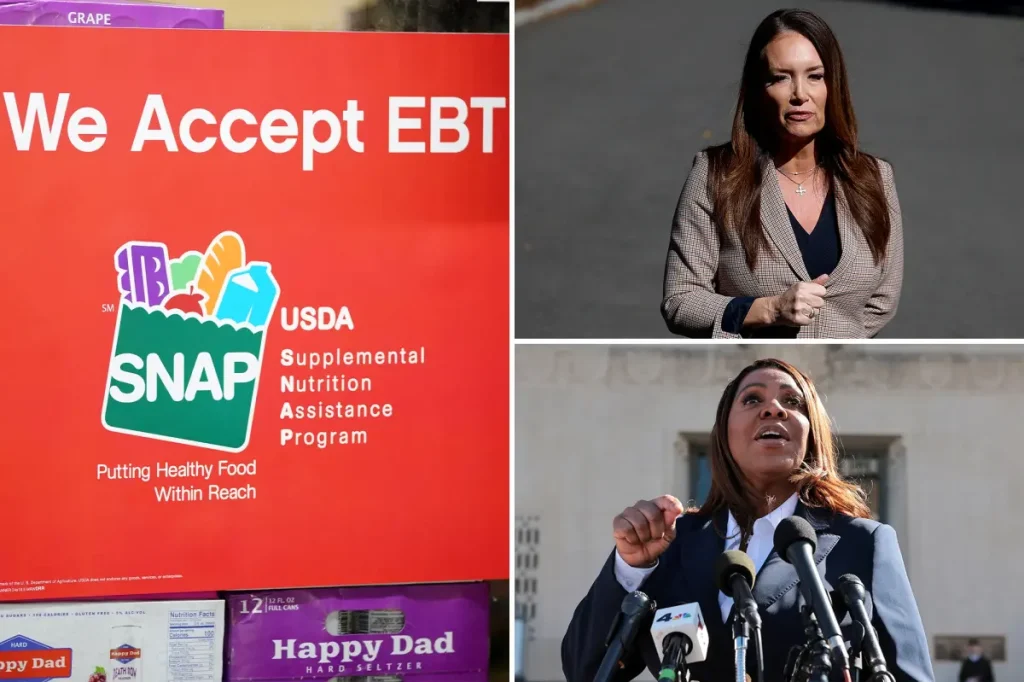States Sue USDA Over SNAP Suspension During Government Shutdown: A Struggle for Food Security
In a dramatic turn of events, more than two dozen states filed a lawsuit Tuesday against the U.S. Department of Agriculture, challenging the agency’s decision to suspend November payments for the Supplemental Nutrition Assistance Program (SNAP). Led by New York Attorney General Letitia James, the coalition of 26 Democratic state leaders argues that cutting off food assistance to over 42 million Americans during the government shutdown violates federal law. “Millions of Americans are about to go hungry because the federal government has chosen to withhold food assistance it is legally obligated to provide,” James stated firmly. This unprecedented situation could mark the first lapse in SNAP funding in 60 years, threatening a critical safety net that serves the nation’s most vulnerable populations – including nearly a million children and 600,000 older adults in New York alone.
The lawsuit centers on what the states describe as a failure by the USDA to utilize available resources during the shutdown. While October benefits were distributed before the government shutdown began on October 1, the USDA has claimed “the well has run dry” for November payments, blaming Democrats for the funding holdup. However, the coalition of states argues that approximately $6 billion in contingency funds could and should be used to maintain the program during the funding gap. The legal challenge specifically contends that suspending SNAP violates the Food and Nutrition Act, which mandates that “assistance under this program shall be furnished to all eligible households,” as well as the Administrative Procedure Act, with states characterizing the benefit suspension as “arbitrary and capricious.” With the average monthly benefit amounting to $187 per person for recipients who typically have incomes at or below the poverty level, the impact of this suspension cannot be overstated.
The political dimensions of this crisis have become increasingly apparent as both parties attempt to navigate the fallout. Before filing the lawsuit, Attorney General James and 22 other attorneys general wrote directly to Agriculture Secretary Brooke Rollins, requesting the use of contingency funds to cover November benefits. The Trump administration’s response was unequivocal – claiming these funds were not “legally available” for regular benefits and citing Hurricane Melissa as a reason to reserve funds for disaster areas. This position directly contradicts the USDA’s own earlier shutdown plan, which reportedly stated the department is legally obligated to continue issuing SNAP benefits during a shutdown. The lawsuit now seeks a temporary restraining order to compel the USDA to utilize contingency funds for November benefits, potentially preventing millions from losing access to essential food assistance.
The human impact of this funding suspension extends far beyond political talking points. Children and seniors make up nearly 60% of all SNAP recipients nationwide, and more than a million veterans depend on the program for their basic nutritional needs. For many families living paycheck to paycheck, SNAP benefits represent the difference between having enough food to last the month and facing hunger. The prospect of this assistance suddenly disappearing has created immediate anxiety and uncertainty. States have begun encouraging residents to locate food banks and stock up on goods to carry them through the next month – a stopgap measure that highlights the severity of the situation. Food banks across the country, already stretched thin by increased demand during economic challenges, now face the prospect of being overwhelmed if millions suddenly lose their primary means of accessing food.
Within the Senate, the crisis has created unexpected divisions among Republicans, some of whom represent rural districts where SNAP participation is particularly high. Senate Appropriations Chair Susan Collins and other Republican senators have signed onto a bill from Senator Josh Hawley (R-Mo.) aimed at keeping the program running during the shutdown, with plans to push for a vote this week. When asked directly if she wanted the administration to allow SNAP benefits to continue in November, Collins replied simply, “I certainly do.” This position reflects the political reality that hunger knows no partisan boundaries, and the consequences of allowing SNAP to lapse would be felt across both red and blue states. Senate Majority Leader John Thune has indicated that Republican senators would discuss the funding issue, while maintaining that the most straightforward solution would be for Democrats to vote to end the shutdown.
The lawsuit represents more than just a legal challenge; it embodies the human struggle at the heart of this political impasse. The attorneys general of Arizona, California, Colorado, Connecticut, Delaware, Hawaii, Illinois, Maine, Maryland, Massachusetts, Michigan, Minnesota, Nevada, New Jersey, New Mexico, North Carolina, Oregon, Rhode Island, Vermont, Washington, Wisconsin, and the District of Columbia, along with the governors of Kansas, Kentucky, and Pennsylvania, have united across geographic and demographic lines in recognition of SNAP’s essential role in their communities. As one Oklahoma senator noted, the government could fully fund the SNAP program by reopening the government “in 30 minutes from now” – a statement that underscores both the simplicity and the complexity of the solution. With Saturday marking the potential beginning of a historic lapse in food assistance, millions of Americans are left wondering how they will feed their families if a resolution is not reached. The outcome of this lawsuit may determine whether one of the nation’s most effective tools against hunger continues to serve those who need it most during an already challenging time of government dysfunction.


